Blacknose Sheep: Ultimate Guide to the World’s Cutest Sheep
Published: April 24, 2023
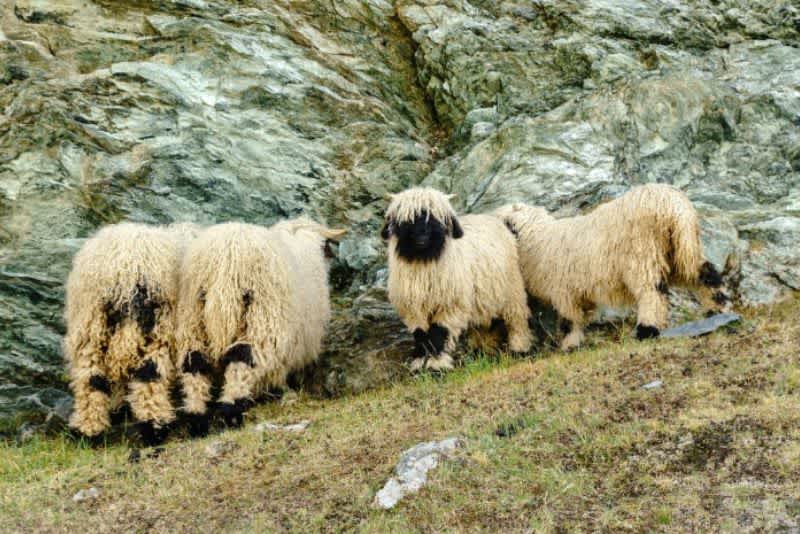
Have you heard about the world's cutest sheep?
The Blacknose Sheep, native to the Valais region in Switzerland, are so cute most can't believe that they're real. These little guys are not just adorable, but they have a lot of interesting characteristics and features that make them stand out from other breeds of sheep.
This article will discuss everything you need to know about Blacknose Sheep: their history, where they come from, what they look like, how they behave, and more. By the end, you'll have a well-rounded understanding of the cutest sheep in the world.
Pros and cons
Here is a quick summary of the pros and cons of the Blacknose sheep.
Pros
Named "the cutest sheep in the world"
Dual purpose (suitable for meat and wool)
Their medium size is ideal
Friendly and calm
Resilient in harsh climates
Cons
Since they are a longwool breed with rapidly growing wool, they are more susceptible to developing health issues such as scald or fly strike which must be closely monitored
They can be hard to find and expensive
What is a Blacknose sheep?
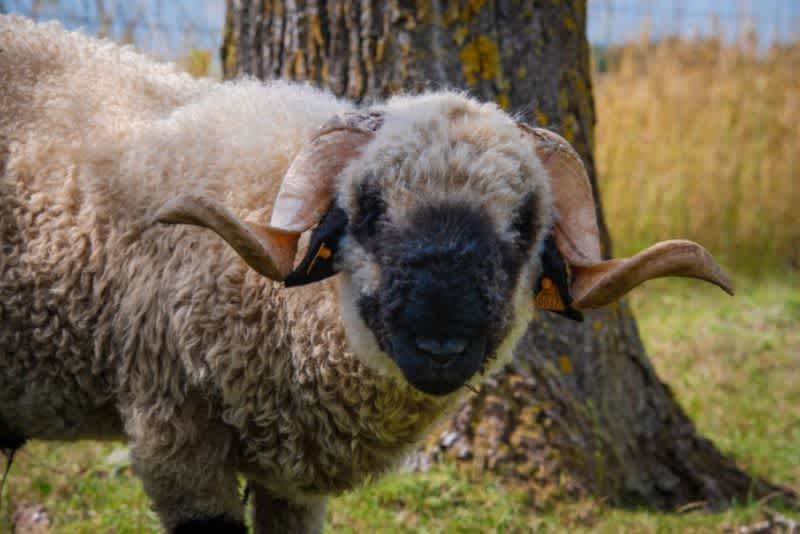
A Blacknose sheep, also called a Valais Blacknose sheep, is considered by many to be the cutest sheep in the world. They are a breed of sheep originating from the Valais region in Switzerland.
They are a dual-purpose breed, suitable for using their wool for felt and carpets and for tasty lean meat. They are also incredibly resilient and have very friendly personalities, making them great pets.
History
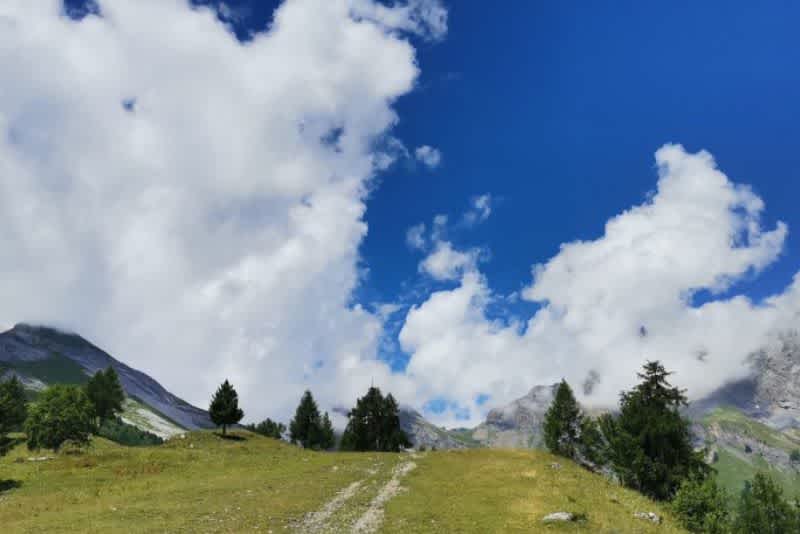
The Valais Blacknose sheep is a breed of domestic sheep that originated in the Canton of Valais, Switzerland. However, the original discovery of the breed is believed to date back to the fifteenth century. They were not recognized officially as a separate breed until 1962.
Human activity has had a detrimental effect on the Blacknose sheep population over the years. For example, in 1884, in an attempt to improve the Blacknose sheep's wool and meat output, they were crossbred with Australian Southdown sheep. However, luckily this didn't work out as this breed combination proved to be less adaptable with wool that was harder to spin and meat too high in fat.
Fast forward to the 1930s, the Blacknose sheep were again in jeopardy, with agencies and associations attempting to create a uniform breed of white mountain sheep that was more desirable in the market. At the same time, tuberculosis and brucellosis wreaked havoc on the Blacknose sheep population.
However, by the 1960s, regulations were lifted, and Blacknose sheep meat returned to the market and became an official breed by 1962. By 2014, the Blacknose sheep appeared in Britain, adapting well to their environment.
Most Valais Blacknose sheep are in Switzerland, followed by some flocks in Germany, and a few hundred in the UK. Some can even be found in the United States, as purebred embryos have recently been allowed into the United States.
Physicality
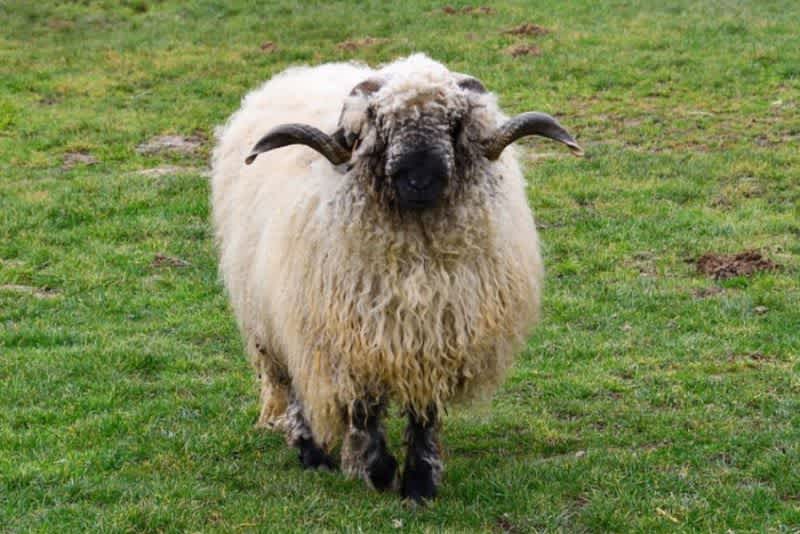
The Valais Blacknose sheep get the reputation of being the "cutest sheep in the world" for a reason. They have coarse white wool with cute black faces. Most people can't believe they're real upon looking at them for the first time.
The Blacknose sheep are an ideal medium-sized breed, with males typically weighing 176-287 lbs (80-130 kg) with a height of 30-33 inches (75-83 cm). Females typically weigh between 154-200 lbs (70-90 kg) with a height of 28-31 inches (72-78 cm).
You can tell the difference between male and female Blacknose sheep by the tail. The female Blacknose sheep will have a tail spot, while the males will not.
In addition to their black faces and white wool, they also have black ears and hooves with short, muscular necks. They have long white wool coats with distinctive black patches on their front knees and ankles. They also have a large framed physique with short legs, wide mouths, and broad foreheads.
And let's not forget the Blacknose sheep's spiral horns. Both male and female Blacknose sheep have horns giving them a unique look.
Personality

The Valais Blacknose sheep is known for its friendly and calm personality. They are very easy-going and tend to be quite docile, making them an excellent pet for those looking for an animal with a more gentle nature. They also have a high level of intelligence and enjoy interacting with people, so they make excellent companions.
Since they originate from the rainy, snowy, and mountainous region of Valais in Switzerland, they are naturally hardy and adaptable to different climates with their long wool coats.
However, they do not care for hotter temperatures since they carry such heavy fleece. It's important to ensure adequate shelter, shade, and fresh water in a water trough to keep themselves cool and refreshed throughout the day.
Purpose

These fluffy creatures are primarily used for their wool, prized for how quickly it grows.
They can be shorn twice yearly, producing 4 kilos of wool annually. The sheep wool is incredible for felted sheepskins or carpets. The lamb fleece is soft, and its wool becomes coarser and more durable as it ages.
In addition to their wool, Valais Blacknose sheep are also popular for their meat, which is lean and flavorful. This is likely due to the variety of mountain herbs they feed on.
Blacknose sheep are known for having high fertility rates, which makes them a good choice for farmers wanting to produce large amounts of meat and wool. They breed throughout the year rather than seasonally, like most sheep breeds.
In 1983, there were only 9940 Blacknose sheep. By 2013, they had populated over 17,000.
Besides being dual-purpose for wool and meat, Blacknose sheep are cute and fun to look at and make for great pets. With their distinctive black faces and curly fleece, these sheep have become a cultural icon, appearing in everything from kids' books to viral memes.
Endangerment
Valais Blacknose sheep are considered to be a rare breed.
Despite the surge in population to over 17,000 in 2013, there has been a resurgence of wild wolves in Switzerland. As a result, an estimated population of 14,000 Blacknose sheep exists.
Care
Despite being highly adaptable and resilient in harsh climates, Valais Blacknose sheep require proper care to thrive.
Land
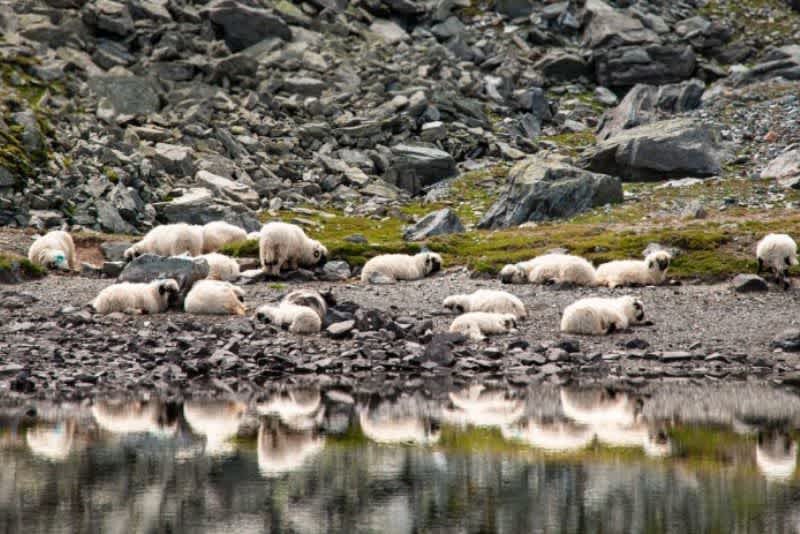
These adorable creatures can thrive in various locations, but they're mostly home on hilly terrain with open fields and fresh mountain air. These hardy sheep are agile climbers and are particularly well-suited to the steep slopes and rocky terrain found in their native Switzerland.
It's also important to ensure they can access plenty of high-quality pasture and forage. Giving each sheep 6-10 acres of land is a rule of thumb. Adequate space is essential for them to roam around and graze.
Health
Valais Blacknose sheep are generally quite robust and resistant to disease. But, like any living creature, they aren't completely immune to illness.
Hooves
If you notice a sheep limping or holding a hoof up, it may have what is known as "scald" (also known as interdigital dermatitis) or bacterial infections in its hooves.
You can tell if this is the case if you look at their hooves and see that they are white, red, or swollen. This can happen if the wool overgrows, and since Blacknose sheep have long wool, it's essential always to keep their hooves trimmed.
This is more prone to happen during long wet periods in the winter, so pay close attention during this time of year. To further prevent scald from affecting your Blacknose sheep, regularly bathe their hooves or keep them indoors where the ground is dry.
If you notice your sheep has scald, you can treat this by applying blue or yellow antibiotic spray prescribed by a certified vet.
Worms
Worms can be common in sheep and cause health problems if left untreated.
The most common worms affecting sheep are roundworms. Roundworms can be transmitted through contaminated pasture and, when consumed, can travel to the stomach and small intestine and cause an infection.
Farmers must worm their flocks and closely monitor their animals for signs of illness to prevent infection. For example, a "mucky" rear end can signify worms.
As soon as your sheep arrive at your premises, they should be wormed. You can regularly worm them, or to prevent overdosing, take fecal samples and test to check for worms. One preventative measure against disease is to track and manage records regularly through a database so you can easily review the history.
Check your Blacknose sheep regularly for any unusual signs and act immediately. Make sure you get regular check-ups with a veterinarian to stay up-to-date on vaccinations and receive any necessary medical care.
Overall, if you're looking for a beautiful and healthy breed of sheep, Valais Blacknose is a fantastic choice.
Fly strike
Fly strike is a condition in which sheep become infested with flies that lay their eggs, resulting in maggots that feed on the animal's flesh. This causes infection and can lead to the sheep's death if it is not promptly treated.
Warning this video contains graphic footage of fly strike that starts 4 seconds in.
A sheep may have fly strike if you notice green, red or wet-looking patches in its fleece, flies buzzing around and landing on specific areas of the sheep, and spotting eggs or maggots. They are more susceptible to fly strike when they have thick wool during the warm spring and summer months that can conceal any signs of fly strike.
This is why inspecting each sheep's wool for any signs regularly is essential. Pay close attention to the sheep's horns, hooves, and rear ends. Farmers should generally maintain good hygiene practices on their farms, such as regularly cleaning fecal matter or urine from the animals' coats.
If you can confirm your sheep has fly strike, spray the area immediately with a fly strike preventative spray such as "Clik" or "Crovect," or see a reliable vet immediately.
Shelter
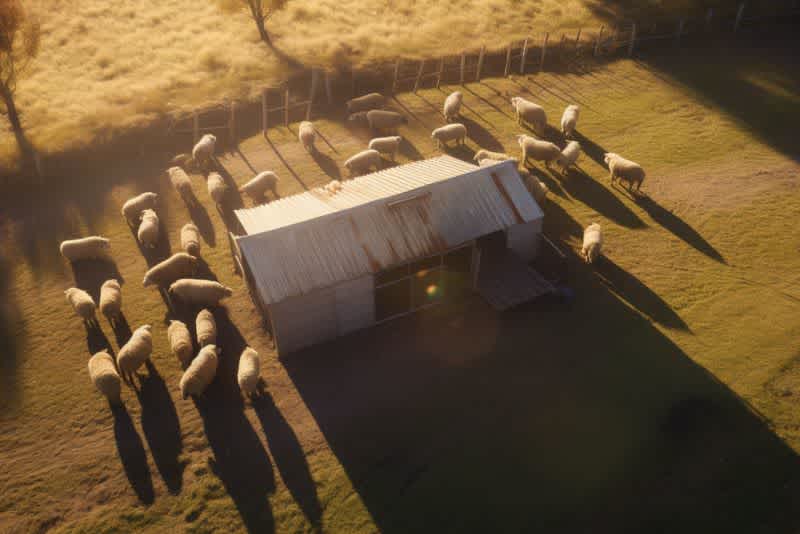
Proper shelter and bedding are also crucial in keeping these wooly friends comfortable and protected from the elements.
While they're incredibly adaptable animals, they require a dry and well-ventilated barn or enclosure to protect them from wind, rain, and extreme temperatures. Good drainage is important for keeping their hooves healthy, and a shelter with clean bedding is ideal.
Additionally, Blacknose sheep are social animals and enjoy being in groups, so providing ample space for them to move around and interact is crucial.
With the proper shelter and care, Blacknose sheep can thrive in various environments and make a wonderful addition to any farm or homestead.
Diet

These fluffy creatures are known to be grazers, meaning they primarily consume grasses, hay, and other vegetation.
When supplying hay, especially in the winter when the grass is not plentiful, place it in hay racks. Feel free to supplement their diet with protein such as alfalfa for growing lambs and pregnant ewes. You should always have a quality vitamin lick accessible to provide the necessary minerals and vitamins for a healthy flock.
With the right care, Valais Blacknose sheep can have happy, healthy lives for many years.
Sheering
Valais Blacknose sheep should be sheared twice yearly, typically in the spring and autumn. Most sheep need to be shorn once a year, but since Blacknose sheep wool grows so quickly, they must be shorn twice yearly.
Sheering is important for these animals as it helps to keep them cool in hot weather, aids with parasite control, and prevents overgrowth of their coats, which can lead to health issues such as scald.
Overall, it's crucial for farmers to sheer their flocks consistently for optimal health and to maintain consistent wool quality.
Where can you buy Blacknose sheep?
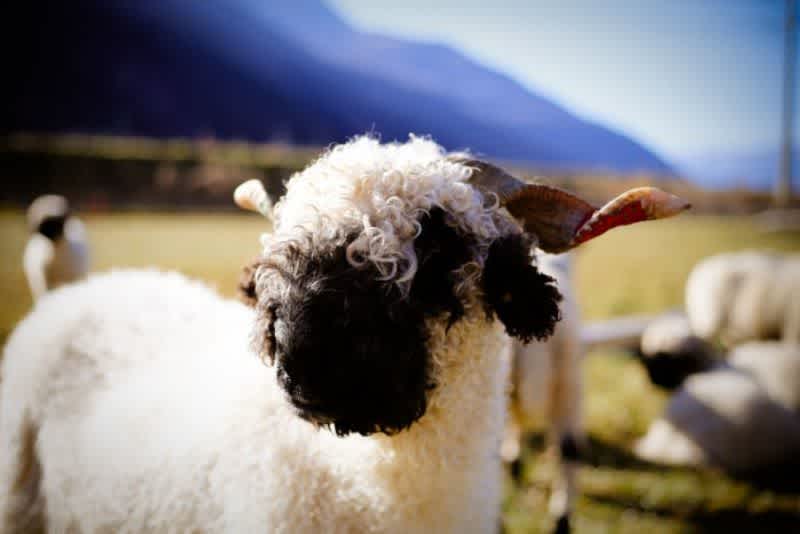
Valais Blacknose sheep can be purchased from a variety of sources.
People interested in buying these animals can see if local farms offer any Blacknose sheep for sale. You can also look at local breeders and classified ads on websites like Craigslist.
Ultimately, it's important that potential buyers research the breeder or seller to ensure they are purchasing healthy animals and will provide them with proper care.
How much are Blacknose sheep?
A Valais Blacknose sheep ranges from $4,000 to $25,000 USD. However, this price can vary depending on location, the age and condition of the animal, its bloodline and breeding history, and any additional services provided by the breeder.
Why are Valais Blacknose sheep so expensive?
Valais Blacknose sheep are rare and highly sought after due to their rare and unique physical characteristics, such as their striking black and white coat pattern, twisted horns, and friendly disposition.
Breeders often carefully select the animals they produce to maintain the highest quality of the breed. As a result, Valais Blacknose sheep are typically more expensive than other types of livestock. Plus, the cost of additional services a breeder provides, such as vaccinations, transportation, and importation fees, can also add to the overall expense.
FAQ
Are Valais Blacknose sheep available in the US?
Yes, Valais Blacknose sheep are available in the United States.
They have become increasingly popular in recent years due to their friendly personality, docile nature, and high level of intelligence. They are primarily found on small farms and as pets in the US. Breeders also offer Valais Blacknose sheep for sale online on their websites.
Do Blacknose sheep make good pets?
Blacknose sheep can make excellent pets for dedicated owners. They are known for being friendly and gentle, ideal for family-oriented farms and operations.
However, potential owners should remember that these animals still require ample care and attention, including regular vaccinations, grooming, diet monitoring, and hoof trimming to prevent scalding. In addition, Valais Blacknose sheep need to be kept in a flock with other sheep since they do best when they have companionship.
Final thoughts on Blacknose sheep
Looking at the unique and captivating Blacknose Sheep, I think we can all agree that they are truly impressive animals.
Not only are they some of the cutest sheep in the world, with their adorable faces and dark noses, but they also have a rich history and a wide range of uses. From providing sustainable wool for clothing and other types of fabrics to having lean and flavorful meat, these sheep can play an important role in offering a fulfilling companionship while supplying materials for modern life.
We should all be thankful for these majestic animals who have been around for centuries, never failing to bring us joy.
With its remarkable personality, physical features, and hardy nature, it's no wonder why Blacknose Sheep are beloved by farmers near and far.
Keep track of all your cattle with the #1 Cattle Management Software
Try out Ranchr today for free